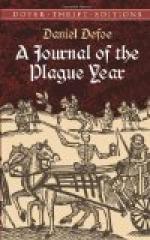I saw both these stars, and, I must confess, had had so much of the common notion of such things in my head, that I was apt to look upon them as the forerunners and warnings of God’s judgments, and, especially when the plague had followed the first, I yet saw another of the like kind, I could not but say, God had not yet sufficiently scourged the city.
The apprehensions of the people were likewise strangely increased by the error of the times, in which I think the people, from what principle I cannot imagine, were more addicted to prophecies, and astrological conjurations, dreams, and old wives’ tales, than ever they were before or since.[46] Whether this unhappy temper was originally raised by the follies of some people who got money by it, that is to say, by printing predictions and prognostications, I know not. But certain it is, books frighted them terribly, such as “Lilly’s Almanack,"[47] “Gadbury’s Astrological Predictions,” “Poor Robin’s Almanack,"[48] and the like; also several pretended religious books,—one entitled “Come out of Her, my People, lest ye be Partaker of her Plagues;"[49] another called “Fair Warning;” another, “Britain’s Remembrancer;” and many such,—all, or most part of which, foretold directly or covertly the ruin of the city. Nay, some were so enthusiastically bold as to run about the streets with their oral predictions, pretending they were sent to preach to the city; and one in particular, who, like Jonah[50] to Nineveh, cried in the streets, “Yet forty days, and London shall be destroyed.” I will not be positive whether he said “yet forty days,” or “yet a few days.” Another ran about naked, except a pair of drawers about his waist, crying day and night, like a man that Josephus[51] mentions, who cried, “Woe to Jerusalem!” a little before the destruction of that city: so this poor naked creature cried, “Oh, the great and the dreadful God!” and said no more, but repeated those words continually, with a voice and countenance full of horror, a swift pace, and nobody could ever find him to stop, or rest, or take any sustenance, at least that ever I could hear of. I met this poor creature several times in the streets, and would have spoke to him, but he would not enter into speech with me, or any one else, but kept on his dismal cries continually.
These things terrified the people to the last degree, and especially when two or three times, as I have mentioned already, they found one or two in the bills dead of the plague at St. Giles’s.




